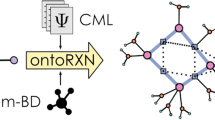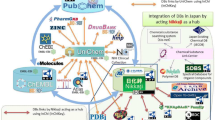Abstract
In this paper, after a new DNA-based semantic model is theoretically proposed, the preliminary experiment on construction of the small test model is successfully done. This model, referred to as ‘semantic model based on molecular computing’ (SMC) has the structure of a graph formed by the set of all (attribute, attribute values) pairs contained in the set of represented objects, plus a tag node for each object. Each path in the network, from an initial object-representing tag node to a terminal node represents the object named on the tag. Input of a set of input strands will result in the formation of object-representing dsDNAs via parallel self-assembly, from encoded ssDNAs representing both attributes and attribute values (nodes), as directed by ssDNA splinting strands representing relations (edges) in the network. The proposed model is rather suitable for knowledge representation in order to store vast amount of information with high density. The proposed model will appears as an interaction between AI and biomolecular computing research fields, and will be further extended for several AI applications.
Preview
Unable to display preview. Download preview PDF.
Similar content being viewed by others
References
Baum, E.B.: How to Build an Associative Memory Vastly Larger than the Brain. Science 268, 583–585 (1995)
Udo, F., Sam, S., Wolfgang, B., Hilmar, R.: DNA sequence generator: A Program for the Construction of DNA Sequences. In: Proc. of the Seventh International Workshop on DNA Based Computers, pp. 21–32 (2001)
Sowa, J.F.: Sematic Networks (2005), http://www.jfsowa.com/pubs/semnet.htm
Rief, J.H.: Parallel Molecular Computation, Models and Simulations. In: Proc. of the 7th Annual Symaposium on Parallel Algorithms and Architectures, pp. 213–223 (1995)
Reif, J.H., LaBean, H.T., Pirrung, M., Rana, V.S., Guo, B., Kingsford, C., Wickham, G.S.: Experimental Construction of Very Large Scale DNA Databases with Associative Search Capability. In: Chen, J., Reif, J.H. (eds.) DNA 2003. LNCS, vol. 2943, pp. 231–247. Springer, Heidelberg (2004) (Revised Papers)
Adleman, L.M.: Molecular Computation of Solutions to Combinatorial Problems. Science 266, 583–585 (1994)
Arita, M.: M Hagiya, and A. Suyama: Joining and Rotating Data with Molecules. In: Proc. of IEEE International Conference on Evolutionary Computation, pp. 243–248 (1997)
Quillian, M.R., Minsky, M.: Semantic Memory, Semantic Information Processing, pp. 216–270. MIT Press, Cambridge (1968)
Author information
Authors and Affiliations
Editor information
Editors and Affiliations
Rights and permissions
Copyright information
© 2005 Springer-Verlag Berlin Heidelberg
About this paper
Cite this paper
Tsuboi, Y., Ibrahim, Z., Kasai, N., Ono, O. (2005). DNA Computing Approach to Construction of Semantic Model. In: Wang, L., Chen, K., Ong, Y.S. (eds) Advances in Natural Computation. ICNC 2005. Lecture Notes in Computer Science, vol 3611. Springer, Berlin, Heidelberg. https://doi.org/10.1007/11539117_158
Download citation
DOI: https://doi.org/10.1007/11539117_158
Publisher Name: Springer, Berlin, Heidelberg
Print ISBN: 978-3-540-28325-6
Online ISBN: 978-3-540-31858-3
eBook Packages: Computer ScienceComputer Science (R0)




